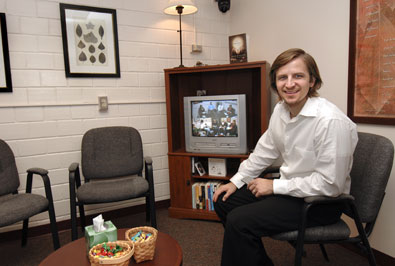Inside Iowa State
Inside ArchivesSubmit newsSend news for Inside to inside@iastate.edu, or call (515) 294-7065. See publication dates, deadlines. About InsideInside Iowa State, a newspaper for faculty and staff, is published by the Office of University Relations. |
Oct. 5, 2007 
Psychologist Nathaniel Wade is director of Network, a group counseling program offered to ISU faculty, staff and community members. The confidential sessions also offer a research and training component for psychology graduate students. Photo by Bob Elbert. Group powerby Steve Jones, LAS Public Relations There's power in a group -- just ask Nathaniel Wade, director of Network, a new group counseling and research program at Iowa State. An assistant professor in the psychology department and a licensed psychologist, Wade started the group counseling program in 2005. Network is one of only a handful of counseling programs at U.S. universities that have three distinct functions: group therapy, original research and graduate student training. At first, psychology majors used the program to conduct research on groups. "It has now grown to be a research and training program offering services primarily for faculty, staff and community members," Wade said. Students are eligible to participate, but they first are referred to ISU's Student Counseling Service, which offers both individual and group therapy. "Network doesn't compete with Student Counseling Service, which only serves ISU students," Wade explained. "Our services pick up where theirs ends -- with faculty, staff and community members." Bob Newhart isn't hereGroup counseling is different than a support group. "In support groups, people find support and realize they're not alone," Wade explained. "Although that's helpful, group therapy can provide more than this." Group counseling also is not individual counseling in a group setting. And it's not like the comical sessions portrayed on television in Ted Danson's Help Me Help You or the 1970s favorite, The Bob Newhart Show. Instead, groups allow people to be themselves, express their concerns and help others who also are struggling. A prospective group member meets with a Network therapist to determine whether that person is a good fit for group counseling. If so, the individual either is assigned to an existing group or will wait for a new one to commence. The issues and problems steering people to the program vary widely: depression, anxiety, substance abuse, grief, self-abusive behavior, or life adjustments -- perhaps from a job loss or divorce. "These are pretty diverse concerns, but people in the group often find deeper connections," Wade noted. Wade or another licensed therapist facilitates each group, and an advanced counseling psychology Ph.D. student may co-lead. Groups usually have from six to 10 individuals and meet in a comfortable room in Science I. Members are encouraged to share their concerns and experiences at their own pace, although sharing is not required. "People can benefit from the group even when they say little but listen carefully to others," Wade said. Sessions are videotaped, primarily for quality assurance and supervision. But the tapes also are used for research. However, client confidentiality is paramount. Group guyA self-described "East Coast guy," Wade first came to the Midwest to attend Wheaton College in suburban Chicago. With a bachelor's degree in hand, he returned to Maryland as a counselor for substance abusers and those on the wrong side of the legal system. He started leading groups then, and the experiences defined his career. "I just loved it," Wade said. "It was something that naturally clicked with me." He later enrolled at Virginia Commonwealth University, well known for its group counseling program. He found academic work was a good fit for him, and he earned a Ph.D. in counseling psychology in 2003, the same year he came to Iowa State. High quality, low costWade said a successful counseling group operates as a social microcosm. "We want to recreate the types of experiences members have in their everyday lives," he noted. For example, when a naturally dominant or passive person acts that way in the group, Wade wants to highlight it and help people to see their impact on others. "The power in the group for healing is around the social microcosm," Wade continued. Often he will "freeze the action" to discuss a particular issue in a way that can't be done in everyday life. "They can actually experience their own interactive style that is contributing to their own problem," Wade said. "Instead of just talking about it, they can experience it. And then they can practice different ways of interacting." Network is free for members of the ISU community and $10 per session for others. The fee will be waived if the member agrees to be a participant in the research. "It's a high-quality, low-cost service," Wade said. The number of sessions needed for each member varies. If the concern is temporary, six to 10 sessions might work. Others will need more. At Network, there is no limit to the number of sessions one can attend. The program has capacity for growth -- the staff can do up to five groups a week but only one is currently active. Wade hopes the program's new name and additional marketing will raise its profile. In the meantime, he said he has been truly satisfied with the program. "It's very meaningful, rewarding work. In a group, you can get compassion and support and get it from a peer. That's powerful." |
Quote"It's very meaningful, rewarding work. In a group, you can get compassion and support and get it from a peer. That's powerful." Nathaniel Wade, director of Network |